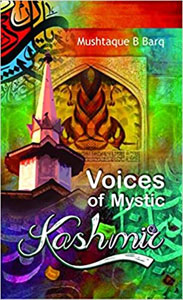
By Mushtaq Ul Haq Ahmad Sikander, New Age Islam
17 April 2020
Voices of Mystic Kashmir
Author: Mushtaque B Barq
Publisher: Jay Kay Books, Kashmir, India
Pages: 152 Price: Rs 495

Mysticism and Sufism both are contested terms in the eyes of sectarian, literalist and exclusivist Ulema and theologians. Kashmir valley in the local parlance is known as PirVare (Abode of Saints). Islam in Kashmir has a Sufi tinge and streak that still can be witnessed in the daily lived experience of Muslims. Sufi saints were responsible for the spread of Islam in Kashmir. In Kashmir, Sufism developed its own indigenous order and networks known as Rishism. As is the norm with Sufis and mystics (though there is subtle difference among them) poetry is the most common medium of expression of the mystic experiences, and Kashmiri mystics are no exception to it. Most Rishis communicated and chose Kashmiri language to express themselves. Their verses, anecdotes and stories are well known in local parlance.
The current book under review is a translation of seven such mystic poets of Kashmir, by a versatile writer and translator Mushtaque B Barq. Translating such poets in English is indeed a great feat, as it is to introduce these local mystic voices to the global audience. In his foreword to the book, Sufi scholar Dr Maroof Shah states how Barq’s translation is different, “Much acclaimed Kashmiri critics have struggled a lot and infact failed to translate more important but difficult works of Kashmiri Sufi poets. Barq can’t be expected to have solved all the problems while translating and we need multiple translations for more adequate rendering. His translation will, however, be helpful for other translators. Since we have very few quality translations of parts of Sufi poetry and the market is suffused with a lot of either patently wrong translations or translations by those who are rather unsympathetic to mysticism or those who know it only from a distance, Barq’s attempt is a welcome addition that does fill part of the enormous gap in the field of quality translations of Kashmiri Sufi poetry in English.”
Barq himself is a practicing Sufi and a major portion of this book comprises the translation of his Murshid (Mentor’s) Mir Hassan Haseen’s Kashmiri poetry. Although Haseen is a contemporary Sufi master, but he is lesser known as compared to his predecessors like Niyama Sahab, ShamasFaqir, Shah Qalandar, Rahim Sahab, Rehman Dar, SochKral whose poetry has been rendered into English language by Barq. Haseen the contemporary mystic poet uses metaphors as is common in mystic poetry to make the seekers understand difficult lessons
Like a moth to this radiant face I will gyrate
Do Show me where your residence is
Your adorable garden I will nurture with tears mine
Draw closer I will harbour you in bosom mine (P-16)
How long has been Haseen (waiting)
Make him to sip from your store
Oh! The crow, do narrate the same (to him) (P-68)
Drawing on metaphors to describe his love for the beloved Haseen explains
Of water hyacinth madeth thy face, Bengali hair
Thy love burnt marrow mine
Pearl madeth thy tooth set, of sandalwood thy conduct
Dear bosom friend adore you, adore you (P-26)
Speaking about love and the sacrifices it demands, Haseen invokes Mansur Hallaj’s example to explain his point
One who offered everything in charity for you!
He obtained unification
Mansoor offered his head to the word of decree
I acquire craziness (P-28)
What Love does to the soul according to Haseen is described in these verses
The Love trimmed me down
To whom I shall narrate serenely
You placed me on the love blaze
You reduced me to rubble (P-40)
The issue of WahdatulWajood (Unity of Being) is a contested topic even among Sufis but Haseen appears to be its votary
Alone (He is) at over and under
Both are done by the same blaze
I am enthralled in that web
To the accent of flute
Do lost in the nowhere Oh Haseen
Do carry on Unity of Being
Be fixated to the spotlight
To the accent of flute (P-48)
Similar thoughts are echoed by Niyama Saheb, in these words
Looked (I) at every nook and corner
(He) destined at Lamakan
He is in me
He is yet to be recognized (P-96)
ShamasFaqir too seems to follow the Unity of Being school of thought as he observes
In the Nothingness where from appeared
Tell me what name endured lo!
With that ShamasFaqir be entirely united
Put in the picture your observations lo! (P-106)
The need for Murshid is central to every mystic discourse and Rahim Sahib of Sopore explains it succinctly
Do search in pains first
If you are a lover, do die alive
Then hunt for the Guru
Mind your way, a moment you stay
No way leads to destiny without Guru
You may lose the way
Do bow before someone
That leads you to providence, a moment you stay (P-124)
It is commonly followed that most of these mystics were illiterate, but the new scholarship and the canvass of their poetry proves that they were aware about the holy scriptures, Muslim history, sufis of the past, their legends that certainly they invoked as examples in their own poetry. Most of these mystics carry an imprint of pioneering Rishi poets like Lal Ded and Sheikh Ul Alam’s on their poetry. These two can be described as the founders of the Rishi order in Kashmir. The poetry of Lal Ded and Sheikh ul Alam still inspires generations of poets and these all poets too seem to follow their message.
The translations are an important addition to the Kashmiri mystic poetry and introducing them to the world audience. Mr Barq deserves all appreciations for rendering the Kashmiri poetry into English. He has followed theme based chapterisation while translating the verses of these diverse mystics. However explanatory notes of various themes would have helped, although a glossary is the part of the book but still terms like Lahn e Dawood (P-18) have not been explained. Instead of footnotes should have been provided to explain the difficult terms. Also in many places appropriate terms could have been used while translating instead of Guru (P-124) term Murshid or Mentor would have sufficed better. Overall the work is a commendable addition to the rare literature available in English regarding Kashmiri mysticism.
M.H.A.Sikander is Writer-Activist based in Srinagar, Kashmir

No comments:
Post a Comment